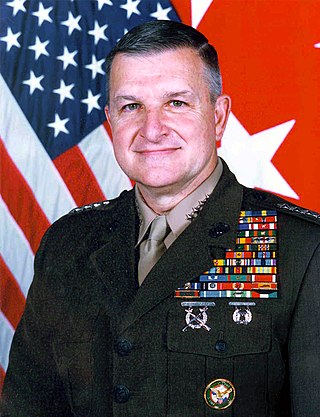
Anthony Charles Zinni is a former United States Marine Corps general and a former Commander in Chief of the United States Central Command (CENTCOM). From 2001 to 2003, he served as a special envoy for the United States to Israel and the Palestinian Authority. From 2017 to 2019, he served as a special envoy to help resolve the Qatar diplomatic crisis.

Morgan Stanley is an American multinational investment bank and financial services company headquartered at 1585 Broadway in Midtown Manhattan, New York City. With offices in 41 countries and more than 75,000 employees, the firm's clients include corporations, governments, institutions, and individuals. Morgan Stanley ranked No. 61 in the 2023 Fortune 500 list of the largest United States corporations by total revenue and in the same year ranked #30 in Forbes Global 2000.
A life settlement is the legal sale of an existing life insurance policy for more than its cash surrender value, but less than its net death benefit, to a third party investor. The investor assumes the financial responsibility for ongoing premiums and receives the death benefit when the insured dies. The primary reason the policyowner sells is because they can no longer afford the ongoing premiums, they no longer need or want the policy, to fund long-term care, increased medical costs, or they need money for other expenses. On average, the policyowner receives three to five times more than the surrender value for the policy.

Financial services are economic services tied to finance provided by financial institutions. Financial services encompass a broad range of service sector activities, especially as concerns financial management and consumer finance.

Fidelity Investments, formerly known as Fidelity Management & Research (FMR), is an American multinational financial services corporation based in Boston, Massachusetts. Established in 1946, the company is one of the largest asset managers in the world, with $4.9 trillion in assets under management, and, as of December 2023, $12.6 trillion in assets under administration. Fidelity Investments operates a brokerage firm, manages a large family of mutual funds, provides fund distribution and investment advice, retirement services, index funds, wealth management, securities execution and clearance, asset custody, and life insurance.
Putnam Investments is an investment management firm founded in 1937 by George Putnam, who established one of the first balanced mutual funds, The George Putnam Fund of Boston.
World Group Securities, Inc. (WGS), a member of the Dutch-owned AEGON Group, is the exclusive broker-dealer affiliate of World Financial Group (WFG).

Ameriprise Financial, Inc. is a diversified financial services company and bank holding company incorporated in Delaware and headquartered in Minneapolis, Minnesota. It provides financial planning products and services, including wealth management, asset management, insurance, annuities, and estate planning.

Edward D. Jones & Co., L.P.,, simplified as Edward Jones, is a financial services firm headquartered in St. Louis, Missouri, United States.

A custodian bank, or simply custodian, is a specialized financial institution responsible for providing securities services. It provides post-trade services and solutions for asset owners, asset managers, banks and broker-dealers. It is not engaged in "traditional" commercial or consumer/retail banking like lending.

A financial adviser or financial advisor is a professional who provides financial services to clients based on their financial situation. In many countries, financial advisors must complete specific training and be registered with a regulatory body in order to provide advice.
LPL Financial Holdings Inc. was founded in 1989 and is considered the largest independent broker-dealer in the United States. As of 2021 the company had more than 17,500 financial advisors, over US$1 trillion in advisory and brokerage assets, and generated approximately $5.9 billion in annual revenue for the 2020 fiscal year.
A registered investment adviser (RIA) is a firm that is an investment adviser in the United States, registered as such with the Securities and Exchange Commission (SEC) or a state's securities agency. The numerous references to RIAs within the Investment Advisers Act of 1940 popularized the term, which is closely associated with the term investment adviser. An investment adviser is defined by the Securities and Exchange Commission as an individual or a firm that is in the business of giving advice about securities. However, an RIA is the actual firm, while the employees of the firm are called Investment Adviser Representatives (IARs).

Stifel Financial Corp. is an American multinational independent investment bank and financial services company created under the Stifel name in July 1983 and listed on the New York Stock Exchange on November 24, 1986. Its predecessor company was founded in 1890 as the Altheimer and Rawlings Investment Company and is headquartered in downtown St. Louis, Missouri.
The Financial Industry Regulatory Authority (FINRA) is a private American corporation that acts as a self-regulatory organization (SRO) that regulates member brokerage firms and exchange markets. FINRA is the successor to the National Association of Securities Dealers, Inc. (NASD) as well as to the member regulation, enforcement, and arbitration operations of the New York Stock Exchange. The U.S. government agency that acts as the ultimate regulator of the U.S. securities industry, including FINRA, is the U.S. Securities and Exchange Commission (SEC).

Mary Lovelace Schapiro served as the 29th Chair of the U.S. Securities and Exchange Commission (SEC). She was appointed by President Barack Obama, unanimously confirmed by the U.S. Senate, and assumed the Chairship on January 27, 2009. She is the first woman to be the permanent Chair of the SEC. In 2009, Forbes ranked her the 56th most powerful woman in the world.

Elisse B. Walter was the 30th Chair of the U.S. Securities and Exchange Commission (SEC) from December 14, 2012 – April 10, 2013. She was appointed Chair by President Barack Obama on November 26, 2012, and sworn in on December 14, 2012. She was originally appointed as one of five SEC Commissioners by President George W. Bush and sworn in on July 9, 2008. Under designation by President Obama, she later served as Acting Chair during January 2009. She served as a Commissioner of the SEC until August 9, 2013.
Guggenheim Partners, LLC is a global investment and advisory financial services firm that engages in investment banking, asset management, capital markets services, and insurance services.

Northwestern Mutual is an American financial services mutual organization based in Milwaukee, Wisconsin. The financial security company provides consultation on wealth and asset income protection, education planning, retirement planning, investment advisory services, Financial Planning trust and private client services, estate planning and business planning. Its products include life insurance, permanent life insurance, disability income, and long-term care insurance; annuities; investments; and investment advisory products and services. Northwestern Mutual ranked No. 90 on the 2021 Fortune 500 list of the largest United States corporations by total revenue and is in the top 30 by assets held. The firm distributes a portion of its earnings to eligible policyholders as annual dividends.
Donnelley Financial Solutions (DFIN) is a financial compliance company based in Chicago, Illinois, United States. The company provides software as a service (SaaS) products, software-enabled services (SeS), print, and compliance services related to US Securities and Exchange Commission regulations to companies in capital and investment markets.











